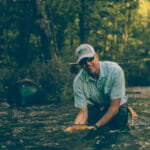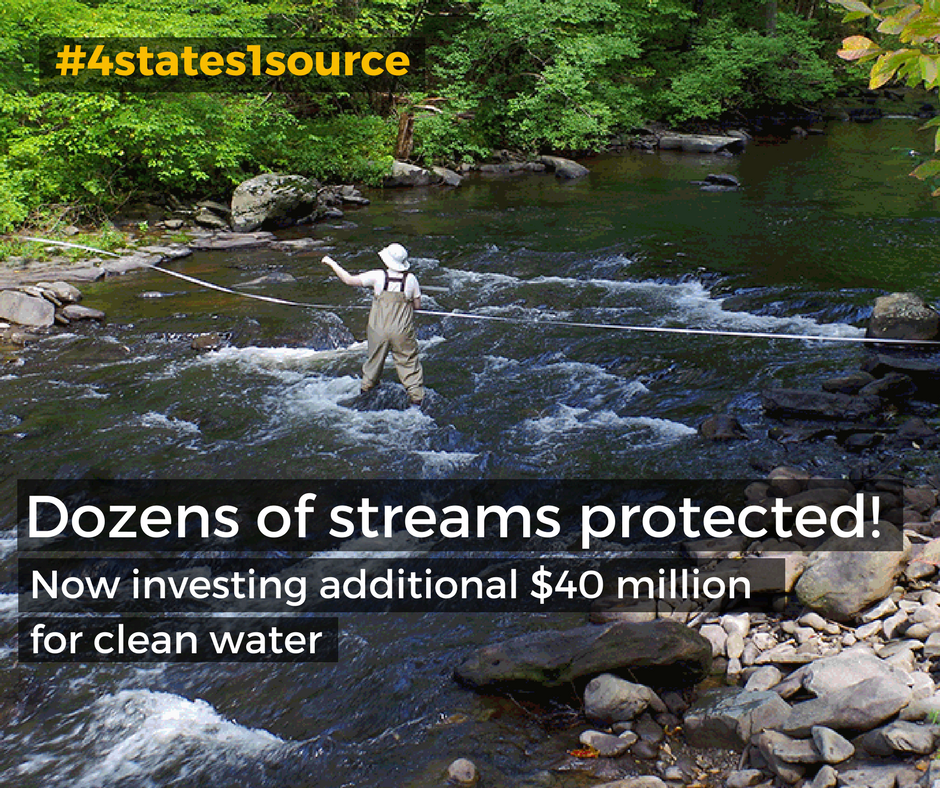Trout Unlimited is leading a major project to protect clean water in the New Jersey Highlands, as a member of the Delaware River Watershed Initiat
ive (DRWI).
The William Penn Foundation announced more than $40 million in new funding for the DRWI, which is among the country’s largest non-governmental conservation efforts to protect and restore clean water. The DRWI is a first-of-its-kind collaboration involving 65 non-governmental organizations working together to protect and restore the Delaware River and its tributaries, which provide drinking water for 15 million people in New Jersey, Pennsylvania, New York, and Delaware.
At a time when the federal government is redefining its role in environmental protection, leadership by public agencies and NGOs at the state and local levels is more important than ever to keep our water clean. Federal policies over the past several decades, such as the Clean Water Act, have successfully reduced pollution in waterways nationwide. Yet recent rollbacks of protections, and budget cuts for the federal Environmental Protection Agency, threaten to slow or reverse progress.
The DRWI’s bottom-up approach represents a strategic path forward for the Delaware River basin. It is a nationally significant model that demonstrates the power of an organized, independent, non-profit-driven approach that encourages partnership between communities and the philanthropic sector.
“Here in the NJ Highlands, working with local partners, we’ve been able to restore over 3 miles of stream that is critical to healthy watersheds and clean water,” said Cole Baldino, Upper Delaware River program manager for Trout Unlimited. “Even more exciting, these new investments will allow us to restore more than 4 miles of stream in the next three years. This will have a lasting impact to protect our clean water, so that it’s fishable, drinkable and swimmable for years to come.”
At its 2014 launch, the DRWI catalyzed local and regional groups to accelerate conservation efforts. The DRWI stands out as a basin-scale program driven by non-profits and guided by science. In just over three years DRWI partners have strategically:
-
initiated projects that will protect 19,604 acres and restore an additional 8,331 acres, and
-
monitored and sampled water quality at more than 500 sites across four states.
This additional $42 million, three-year investment builds on initial successes to protect and restore an estimated 43,484 additional acres and continue science-driven, data-informed efforts to secure clean, abundant water in the basin. The Initiative provides a replicable model that can be used to improve water health across the country.
Threats to the Delaware River basin are significant, demanding a concerted response from private landowners and local officials to protect our natural resources. The DRWI is tackling widespread pollution sources that harm clean water in our rivers and streams: erosion and runoff from deforested acres in headwaters; polluted runoff from agricultural fields; flooding and polluted stormwater from cities and suburbs; and a depleted aquifer in southern New Jersey. These growing problems will threaten drinking water for millions of people every day if left unaddressed.
“By design, The Delaware River Watershed Initiative aligns the work of 65 organizations in the watershed to accelerate conservation,” said Andrew Johnson, program director for Watershed Protection at the William Penn Foundation. “The Initiative is rooted in the strength of these organizations individually and in their ability to collaborate using science to target the most important places for conservation. Together they are protecting and restoring those places, measuring the impact of their efforts on local streams, and learning collectively to improve their work.”
Baldino said the future generations will benefit from the effort.
“Through this work, we will ensure a healthier watershed for generations to come,” Baldino said. “Not only will they have clean water, but they will be able to witness the reemergence of the East’s only native trout, the brook trout, which is a symbol of exceptional water quality.”
###
About Trout Unlimited
Trout Unlimited is a private, non-profit organization with 150,000 members dedicated to conserving, protecting, and restoring North America’s coldwater fisheries and their watershed. As part of the DRWI, they specialize in stream restoration to ensure clean drinking water and exceptional water quality, while incorporating ecological and recreation benefits.
About the Delaware River Watershed Initiative
The Delaware River Watershed Initiative is a collaboration of 65 leading nonprofit organizations that have developed shared action plans to reduce four priority threats to clean water. Informed by science, the Initiative is working in eight targeted areas, where analysis indicated that interventions could significantly safeguard or improve clean water. Together, these eight areas constitute 25 percent of the river basin and include portions of Delaware, Pennsylvania, New Jersey and New York. For more information, including a list of all participating organizations, visit www.4states1source.org.



